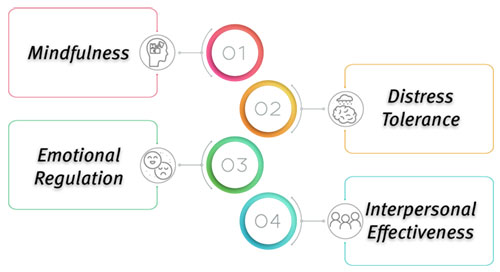Dialectical Behavioral Therapy
Dialectical Behavioral Therapy (DBT) was developed from Cognitive Behavioral Therapy (CBT), and there is significant overlap. Whereas CBT focuses on the underlying beliefs and thoughts that influence feelings and behaviors, DBT builds mindfulness and acceptance that helps youth through moments of pain and discomfort.
These techniques can be incredibly helpful for those with extreme emotional reactions, allowing them to recognize and acknowledge their pain and still feel safe. This is empowering, as they gain a better ability to choose how they want to interact with the world.
DBT includes some focus on thoughts, but the core work is in identifying emotional triggers and developing healthier responses and coping mechanisms. Essentially, it focuses on changing impulses and behavior patterns rather than talking through issues, and finding balance in the relationship between acceptance and change. There are four main skills that DBT works to develop.

What are the 4 Skills of Dialectical Behavioral Therapy?
Mindfulness: Being aware and focused on the present and controlling ones attention. This brings with it the ability to observe what is happening in the moment, both internally and externally.
Distress Tolerance: Learning to understand, accept, and develop more effective ways of managing situations of intense emotions and crisis.
Emotional Regulation: Identifying and labeling emotions, becoming less vulnerable to negative emotions, and changing emotional responses when facing situations.
Interpersonal Effectiveness: Communicating needs and setting boundaries in a respectful way, which improves both relationships with others and self-respect.

What conditions have DBT been shown effective for?
Dialectical Behavioral Therapy is particularly effective for people who experience intense negative emotions, and who have developed unhelpful coping mechanisms as a response to them. It has been shown to be effective in a wide range of mental health conditions including:
- Anxiety
- Depression
- Post Traumatic Stress Disorder (PTSD)
- Borderline Personality Disorder (BPD)
- Self Harm
- Suicidal Behavior
- Substance Use Disorder
- Eating Disorders

